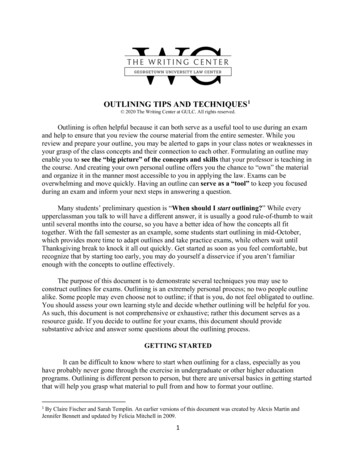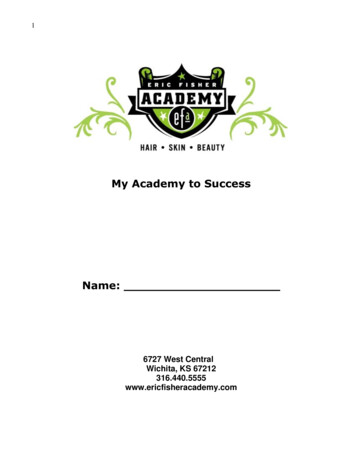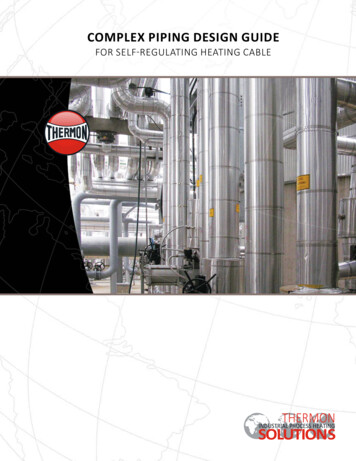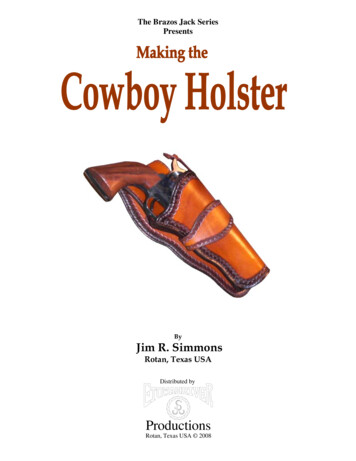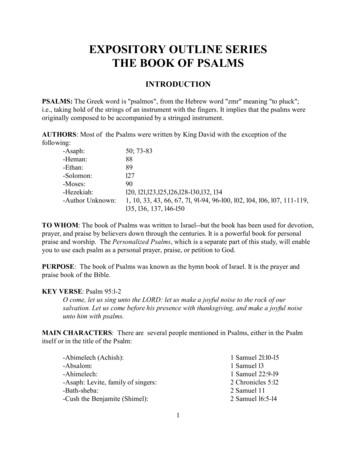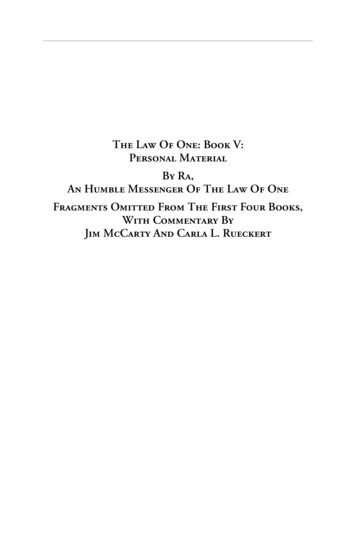
Transcription
Outline of the Book of ExodusIntroduction and Overview of the Book of Exodus:The book of Exodus covers a span of approximately 360 years from the death of Joseph (Ex. 1:6) to theerecting of the tabernacle in the wilderness of Sinai (Ex. 40:1ff). The name “Exodus” means “a going out, amarching out, military expedition. a way out, outlet” (LS 275). The Hebrews (descendants of Abraham, Isaac,and Jacob) make a mass exit out of Egypt by the help of God. Genesis ends with the Jews in good standing withEgypt, however, Exodus opens with a new Pharaoh over Egypt “who knew not Joseph” (Ex. 1:8). This newPharaoh makes slaves of the Hebrews who were quickly multiplying. Four hundred years pass in Egypt whilethe people of God develop into the great nation God had promised they would become (Gen. 12:2; 15:12-14).God sends Moses to deliver the Hebrews from their Egyptian bondage.Exodus is a book that illustrates God’s mercy (cf. Ex.19:4). The Lord’s desire was to save Israel through thepromise that He had made to Abraham (cf. Ex. 32:13). Throughout the history of man never has there been agroup of people see with their eyes such miracles and experience the presence of God with regularity. Godshowed the world His great might as he crippled Egypt with plagues. God was with Israel visibly day and nightthrough a cloud and pillar of fire. God fought for Israel defeating Pharaoh’s army. God fed the people withmanna and quail and provided water in the desert places. God gave Israel laws to follow and told them of thedeadly consequences of not keeping His covenant. Israel was truly beloved and cared for by God.We may find it perplexing to note that Israel so quickly murmured and complained against the ever powerfuland present God. Our puzzled minds are soon filled with clarity when we look to the attitude of Pharaoh. Godhardened Pharaoh’s heart by giving him commands to follow; i.e., “let my people go that they may sacrifice andworship ” (cf. Ex. 5:1). Pharaoh states clearly that he will not adhere to Jehovah’s command (Ex. 5:2).Pharaoh is charged with stubbornness in that he had not heeded to God’s commands yet he continued in thisstate (Ex. 7:16). After a few plagues, Pharaoh agrees to follow God’s commands yet it had to be done by hisways and stipulations (cf. Ex. 8:27-28). God’s response is given through Moses at Exodus 10:3, “And Mosesand Aaron went in unto Pharaoh, and said unto him, Thus saith Jehovah, the God of the Hebrews, How longwith thou refuse to humble thyself before me? Let my people go, that they may serve me ” Interestingly, weread, “But Jehovah hardened Pharaoh’s heart, and he did not let the children of Israel go” (Ex. 10:20). Itbecomes apparent that God’s hardening of Pharaoh’s heart came in the form of a command; i.e., “let my peoplego.” This was not something Pharaoh wanted to do. The king of Egypt had other plans for the Hebrews.Why did Pharaoh reject God’s commands even after seeing the power of God? Why did the Hebrewsmurmmer and complain though they saw God’s mighty works? God had bore them “on eagles’ wings” caringfor them each step of the way (cf. Ex. 19:4) and only asks that they keep His commandments (Ex. 19:5). Whyall the disobedience? The answer to man’s greatest problem is herein found. Sin is an even that occurs in mylife when I do what I want rather than what God wants. My heart is hardened against God at times when mywill is set above His will (I Jn. 3:4).Though I sin against God He continues to love me and provide means for my forgiveness. The tabernacleerected in the wilderness is proof of this to both Jew of the Old Testament and modern day man today. Godcommanded Moses to erect the tabernacle, its furnishings, and court yard at Exodus 40. The author of Hebrewstells us that this system was only a shadow or copy of the original blueprint of the church (Heb. 8:1ff). Godintended man to see his need for forgiveness through the Old Testament tabernacle system (cf. Gal. 3:21ff). TheMosaic Law identified sin (Rom. 7:7) and reminded man of their sins (Heb. 10:1ff) yet could do nothing toremove even one sin (Heb. 7:18-19). Through time the Hebrews would understand this and long to see theMessiah who would deliver man from the bondage of sin. The book of Exodus moves man to see his sinfulnessand that God offers provisions for those sins. The direction of life I take lies in my hands. God’s will is that Iwould keep his commandments. The author of Hebrews states, “but exhort one another day by day, so long as itis called To-day; lest any one of you be hardened by the deceitfulness of sin:” (Heb. 3:13).1
Chapter 1I.II.Israel grows into a Mighty Nation (1:1-7):A. “Now these are the names of the sons of Israel, who came into Egypt (every man and his householdcame with Jacob): Reuben, Simeon, Levi, and Judah, Issachar, Zebulun, and Benjamin, Dan andNaphtali, Gad and Asher. And all the souls that came out of the loins of Jacob were seventy souls:and Joseph was in Egypt already” (1:1-5).1. Moses reiterates the number of Hebrew souls that came into Egypt; i.e., seventy in all(cf. Gen. 46:27).2. The twelve sons of Jacob with their families represent the small number that was to grow into amighty nation as per God’s promise at Genesis 12:1ff.B. “And Joseph died, and all his brethren, and all that generation. And the children of Israel werefruitful, and increased abundantly, and multiplied, and waxed exceeding mighty; and the land wasfilled with them” (1:6-7).1. We are not told how much time passed at this point; however, we know that a considerableamount of time did pass so that all twelve sons died (no doubt many died at an old age).2. During these years the people of God multiplied abundantly. God was slowly fulfilling Hispromise to make them a “mighty” nation (cf. Gen. 12:1ff).Israel is afflicted by the Egyptians (1:8-22):A. “Now there arose a new king over Egypt, who knew not Joseph. And he said unto his people,Behold, the people of the children of Israel are more and mightier than we: come, let us deal wiselywith them, lest they multiply, and it come to pass, that, when there falleth out any war, they alsojoin themselves unto our enemies, and fight against us, and get them up out of the land. Thereforethey did set over them taskmasters to afflict them with their burdens. And they built for Pharaohstore-cities, Pithom and Raamses. But the more they afflicted them, the more they multiplied andthe more they spread abroad. And they were grieved because of the children of Israel. And theEgyptians made the children of Israel to serve with rigor: and they made their lives bitter with hardservice, in mortar and in brick, and in all manner of service in the field, all their service, whereinthey made them serve with rigor.” (1:8-14).1. The name of the new King (Pharaoh) is not given (many believe him to be Hyksos). The factthat Israel had now grown significantly in numbers to warrant fear and that Joseph is unknownto the new Pharaoh strongly suggest that much time has elapsed since Joseph’s death.2. The idea of “dealing wisely” with Israel is equated to “subtly” at Psalms 105:25 and“conspiring against” at Genesis 37:18. Pharaoh of Egypt saw a potential danger in theHebrews and made up his mind to act in a subtle and conspiring way against them. The danger,in Pharaoh’s mind, was that the Hebrews would join themselves with the enemies of Egypt.3. Pharaoh’s first way to lessen the Hebrew’s strength was to cast upon them heavy burdens oflabor (turned them into slaves). The Hebrews built store cites (Pithom and Raamses) to housegrain for trade and to support Egyptian troops.4. Pharaoh’s first plan failed. The word of God states, “the more they afflicted them, the morethey multiplied.”a. Here is a great lesson for Christians today. The world tries to oppress us due to ourexposing their sins (Jn. 7:7; I Thess. 3:3; II Tim. 3:12).b. Let the Christian today gain greater incite to our purpose in life when being persecuted fordoing that which is right. Let us grow spiritually stronger the more we are afflicted (seestudy # 1; Bible Persecution).B. “And the king of Egypt spake to the Hebrew midwives, of whom the name of the one was Shiphrah,and the name of the other Puah: and he said, When ye do the office of a midwife to the Hebrewwomen, and see them upon the birth-stool; if it be a son, then ye shall kill him; but if it be adaughter, then she shall live. But the midwives feared God, and did not as the king of Egyptcommanded them, but saved the men-children alive. And the king of Egypt called for the midwives,and said unto them, Why have ye done this thing, and have saved the men-children alive? And themidwives said unto Pharaoh, Because the Hebrew women are not as the Egyptian women; for they2
are lively, and are delivered ere the midwife come unto them. And God dealt well with themidwives: and the people multiplied, and waxed very mighty. And it came to pass, because themidwives feared God, that he made them households. And Pharaoh charged all his people, saying,Every son that is born ye shall cast into the river, and every daughter ye shall save alive” (1:15-22).1. The second way Pharaoh tried to diminish the strength of the Hebrews was to command all themidwives (those who helped the Hebrew women in their child birth) to kill any male childborn. The midwives rejected Pharaoh’s command and so the Hebrew women continued to bearmale and female alive.2. Thirdly, Pharaoh’s anger is truly aroused and in a since of urgency makes the decree that allmale newborn Hebrews were to be cast into the river that they may die.Chapter 2I.II.The Birth of Moses (2:1- 10):A. “And there went a man of the house of Levi, and took to wife a daughter of Levi. And the womanconceived, and bare a son: and when she saw him that he was a goodly child, she hid him threemonths. And when she could not longer hide him, she took for him an ark of bulrushes, and daubedit with slime and with pitch; and she put the child therein, and laid it in the flags by the river'sbrink. And his sister stood afar off, to know what would be done to him. And the daughter ofPharaoh came down to bathe at the river; and her maidens walked along by the river-side; and shesaw the ark among the flags, and sent her handmaid to fetch it. And she opened it, and saw thechild: and, behold, the babe wept. And she had compassion on him, and said, This is one of theHebrews' children. Then said his sister to Pharaoh's daughter, Shall I go and call thee a nurse ofthe Hebrew women, that she may nurse the child for thee? And Pharaoh's daughter said to her, Go.And the maiden went and called the child's mother” (2:1-8).1. The “man of the house of Levi” was Amram (cf. Ex. 6:20; Numb. 26:59). The daughter of Levithat Amram married was Jochebed (Ex. 6:20). Amram and Jochebed already had a son (Aaron)and daughter (Miriam).2. Jochebed saw in Moses “a goodly child” and so hid him that he may be saved from Pharaoh’sedict to kill all Hebrew male babies. The author of Hebrews tells us that the parents of Mosesacted by “faith” when they hid him seeing that he was a “goodly child” (Heb. 11:23). Theappearance of Moses must have been in such a manner that caused his parents to know thatGod had something special in store for him (cf. Acts 7:17-21).3. When Amram and Jochebed could no longer hide Moses they prepared an ark, placed the childin it, and set it in the river flags hoping that some compassionate Egyptian would find the babeand care for it.4. Their prayers were answered when the daughter of Pharaoh, ignores her father’s edictconcerning the Hebrew male children, and takes Moses in to care for him.B. “And Pharaoh's daughter said unto her, Take this child away, and nurse it for me, and I will givethee thy wages. And the woman took the child, and nursed it. And the child grew, and she broughthim unto Pharaoh's daughter, and he became her son. And she called his name Moses, and said,Because I drew him out of the water” (2:9-10).1. Pharaoh’s daughter employs Jochebed, Moses’ real mother, to care for him.2. Moses grew and was educated in the ways of the Egyptians (cf. Acts 7:22).3. God’s providential care is seen in these acts (see study # 2; God’s Providence).Moses as a Man (2:11-25):A. “And it came to pass in those days, when Moses was grown up, that he went out unto his brethren,and looked on their burdens: and he saw an Egyptian smiting a Hebrew, one of his brethren. Andhe looked this way and that way, and when he saw that there was no man, he smote the Egyptian,and hid him in the sand. And he went out the second day, and, behold, two men of the Hebrewswere striving together: and he said to him that did the wrong, Wherefore smitest thou thy fellow?3
And he said, Who made thee a prince and a judge over us? Thinkest thou to kill me, as thou killedstthe Egyptian? And Moses feared, and said, Surely the thing is known” (2:11-14).1. When Moses was forty years old, he decided to visit his brethren (i.e., the Hebrews cf. Acts7:23). We can only infer that while the Egyptians educated Moses, his mother was explainingto him his Hebrew roots.2. Moses clearly had a faith in Jehovah God at this point in his life. When Moses killed theEgyptian we are told that he thought that “his brethren understood that God by his hand wasgiving them deliverance; but they understood not” (Acts 7:25).3. It seems that at this point in Moses life, as he murdered the Egyptian, he had made a choicebetween life as an Egyptian or a Hebrew. The author of Hebrews states, “By faith Moses, whenhe was grown up, refused to be called the son of Pharaoh’s daughter; choosing rather to shareill treatment with the people of God, than to enjoy the pleasures of sin for a season; accountingthe reproach of Christ greater riches than the treasures of Egypt: for he looked unto therecompense of reward. By faith he forsook Egypt, not fearing the wrath of the king: for heendured, as seeing him who is invisible” (Heb. 11:24-27). Moses evidenced his faith in God bymaking the choice to forsake Egypt and thereby is likened to all the other Old Testamentworthies in Hebrews 11.4. Though Moses’ character of faith is lauded in the Bible we cannot overlook the fact that hemurdered an Egyptian. Was this an act of zeal for Jehovah God or the sinful results of anger?It seems that the act would have been considered a zealous and faithful act when comparedwith the act of Phinehas of Numbers 25:6-9.B. “Now when Pharaoh heard this thing, he sought to slay Moses. But Moses fled from the face ofPharaoh, and dwelt in the land of Midian: and he sat down by a well. Now the priest of Midian hadseven daughters: and they came and drew water, and filled the troughs to water their father's flock.And the shepherds came and drove them away; but Moses stood up and helped them, and wateredtheir flock. And when they came to Reuel their father, he said, How is it that ye are come so soonto-day? And they said, An Egyptian delivered us out of the hand of the shepherds, and moreover hedrew water for us, and watered the flock. And he said unto his daughters, And where is he? Why isit that ye have left the man? Call him, that he may eat bread” (2:15-20).1. Moses flees from Egypt to Midian where he meets seven daughters of the priest of Midian.Moses defends them at a watering well and so is well spoken of by the daughters to their father.2. Interestingly, the priest of Midian is referred to as Reuel (friend of God) and then referred to asJethro in Exodus 3:1.C. “And Moses was content to dwell with the man: and he gave Moses Zipporah his daughter. And shebare a son, and he called his name Gershom; for he said, I have been a sojourner in a foreign land.And it came to pass in the course of those many days, that the king of Egypt died: and the childrenof Israel sighed by reason of the bondage, and they cried, and their cry came up unto God by reasonof the bondage. And God heard their groaning, and God remembered his covenant with Abraham,with Isaac, and with Jacob. And God saw the children of Israel, and God took knowledge of them”(2:21-25).1. Moses remains in Midian, maries Zipporah (the daughter of the priest of Midian), and has achild named Gershom. Gershom’s name means banishment or to drive away which seems toindicate the bitter feeling the Moses had in his heart after leaving Egypt.2. After a while, the Pharaoh that had made the Hebrew’s life hard with labor died. At first theHebrews were happy due to the fact that they thought their heavy labor would be lessened;however, it was not. Out of distress and exhaustion the Jews cry out to God to be deliveredfrom their heavy burdens in Egypt and God heard their cries.Facts about the Life of Moses to this Point (see study # 3; A Character Study of Moses):1. Moses was born in Egypt to Amram and Jochebed (cf. Ex. 2:1ff; 6:20).2. There was something peculiar about the physical appearance of Moses at birth. Moses’ parents looked uponhim and determined that God had some special plan for this boy (cf. Ex. 2:2; Acts 7:20).4
3. Moses lived his first 40 years of life being educated by the Egyptians (Acts 7:22).4. It is clear that Moses was also trained in the knowledge of Jehovah God along the way (cf. Acts 7:23). Nodoubt Jochebed told Moses of God’s promises to Abraham, Isaac, and Jacob. Moses would be familiar withthe hope of Christ, the land, and great nation promise (Gen. 12:1ff; Heb. 11:26).5. It is equally clear that not only was Moses educated in the ways of Jehovah but that he had retained thisteaching in his heart until a true and zealous faith was formed. When Moses made the decision to leaveEgypt behind and flee to Midian it was done by faith (cf. Heb. 11:24-27).6. Let us go a step further and state that Moses even knew of his higher calling to be a deliverer over theHebrews who were currently enslaved in Egypt (cf. Acts 7:25).7. Moses illustrates this great zeal when on one occasion a Hebrew was being afflicted by an Egyptian. Mosesdefends the afflicted Hebrews and in vengeance kills the Egyptian (Ex. 2:11-12; Acts 7:24).8. Moses flees Egypt and comes to Midian where he marries Zipporah (the daughter of the priest of Midian).Together they have a son named Gershom (Ex. 2:21-22).Map source: ISBE; vol.4, pp. 526Chapter 3I.God calls Moses to return to Egypt and deliver His people from Bondage (3 all):A. “Now Moses was keeping the flock of Jethro his father-in-law, the priest of Midian: and he led theflock to the back of the wilderness, and came to the mountain of God, unto Horeb. And the angel ofJehovah appeared unto him in a flame of fire out of the midst of a bush: and he looked, and, behold,the bush burned with fire, and the bush was not consumed. And Moses said, I will turn aside now,and see this great sight, why the bush is not burnt” (3:1-3).1. Moses travels southward through the desert of Sinai and comes to a mountain range known asHoreb (a synonymous term with Sinai).2. God appears to Moses in the form of “the angel of Jehovah” and speaks to him from a bush thatburned yet miraculously not consumed.5
B. “And when Jehovah saw that he turned aside to see, God called unto him out of the midst of thebush, and said, Moses, Moses. And he said, Here am I. And he said, Draw not nigh hither: put offthy shoes from off thy feet, for the place whereon thou standest is holy ground. Moreover he said, Iam the God of thy father, the God of Abraham, the God of Isaac, and the God of Jacob. And Moseshid his face; for he was afraid to look upon God. And Jehovah said, I have surely seen the afflictionof my people that are in Egypt, and have heard their cry by reason of their taskmasters; for I knowtheir sorrows; and I am come down to deliver them out of the hand of the Egyptians, and to bringthem up out of that land unto a good land and a large, unto a land flowing with milk and honey;unto the place of the Canaanite, and the Hittite, and the Amorite, and the Perizzite, and the Hivite,and the Jebusite” (3:4-8).1. The “angel of Jehovah” at verse 2 is now termed “God” at verse 4. Some, such as Keil andDelitzsch, believe that the burning bush represents the people of Israel in Egypt as they sufferedaffliction. The fact that the bush burned but was not consumed illustrates the fact that Godchastens His people with affliction yet does not consume them in His mercy (cf. Ps. 118:18).2. Moses is told to take off his shoes (a gesture of reverence and respect) in this place for thepresence of God made it holy. God tells Moses that He is the God of Abraham, Isaac, andJacob (the three patriarchs that God spoke directly to revealing His plan to redeem man throughtheir seed).3. God reveals to Moses that He has heard the cries of anguish from the people of Israel and isnow prepared to deliver them out of Egypt and bring them to the land that He had promisedAbraham, Isaac, and Jacob (i.e., Canaan). Note, that at time of this event, six tribes alreadyoccupied the land God promised to give to Israel.C. “And now, behold, the cry of the children of Israel is come unto me: moreover I have seen theoppression wherewith the Egyptians oppress them. Come now therefore, and I will send thee untoPharaoh, that thou mayest bring forth my people the children of Israel out of Egypt. And Mosessaid unto God, Who am I, that I should go unto Pharaoh, and that I should bring forth the childrenof Israel out of Egypt?” (3:9-11)1. God calls upon Moses to be that vehicle by which He would deliver Israel out of their heavybondage in Egypt.2. Moses begins to make a series of excuses as to why he is not the man for the job. First:Interestingly, when Moses slew the Egyptian that tortured one of his brethren, Moses figuredthat everyone knew that he was that deliverer (cf. Acts 7:25). Now; however, Moses asks God,“who am I, that I should go unto Pharaoh, and that I should bring forth the children of Israelout of Egypt?” It may be that Moses has learned much of humility while in Midian tendingJethro’s flocks and did not consider himself worthy of such an endeavor.D. “And he said, Certainly I will be with thee; and this shall be the token unto thee, that I have sentthee: when thou hast brought forth the people out of Egypt, ye shall serve God upon this mountain”(3:12).1. God answers Moses’ fear, humility, and lack of confidence immediately saying, “I will be withthee.” God is with all who fear Him and keep His commandments (cf. I Jn. 2:5-5).2. God would give Moses a sign to let him know that his mission would not fail. When Mosesbrings Israel to this very same mountain and worships God then Moses would know that Godspeaks the end from the beginning and that He alone is the God of help.E. “And Moses said unto God, Behold, when I come unto the children of Israel, and shall say untothem, The God of your fathers hath sent me unto you; and they shall say to me, What is his name?What shall I say unto them? And God said unto Moses, I AM THAT I AM: and he said, Thus shaltthou say unto the children of Israel, I AM hath sent me unto you. And God said moreover untoMoses, Thus shalt thou say unto the children of Israel, Jehovah, the God of your fathers, the God ofAbraham, the God of Isaac, and the God of Jacob, hath sent me unto you: this is my name forever,and this is my memorial unto all generations” (3:13-15).1. The Israelites in Egypt witnessed first hand the gods of Egypt with their names (i.e., Ra the Sungod meaning the swift, Phthah, Mentu, Hor, Osiris.). They would want to know the name ofJehovah God. To this point of the history of man, God is revealed as the “El, Eliun, and6
Elohim” as the Exalted or Lofty One. Other times as the Shaddai (strong and powerful). Thenagain as Jehovah (Existent). The Lord tells Moses to say, “I AM” is His name. At Genesis15:7, God told Abraham, “I am Jehovah.” This name, “I AM THAT I AM” explains God’sreal and independent existence. The “I AM” thereby takes into consideration all that God is,i.e., exalted, lofty, strong, powerful, ever existent (see study # 4; Who is God?). The prophetIsaiah quotes from the Lord saying, “I am God, and there is none else; I am God, and there isnone like me; declaring the end from the beginning; and from ancient times things that are notyet done; saying, My counsel shall stand, and I will do all my pleasure;” (Isa. 46:9-10).2. When Jesus referred to himself as “I AM” at John 8:58, they took up stones to kill Him becausethey knew full well that this was the name of God. The Jews considered such a statement byJesus to be blaspheme.F. “Go, and gather the elders of Israel together, and say unto them, Jehovah, the God of your fathers,the God of Abraham, of Isaac, and of Jacob, hath appeared unto me, saying, I have surely visitedyou, and seen that which is done to you in Egypt: and I have said, I will bring you up out of theaffliction of Egypt unto the land of the Canaanite, and the Hittite, and the Amorite, and thePerizzite, and the Hivite, and the Jebusite, unto a land flowing with milk and honey. And they shallhearken to thy voice: and thou shalt come, thou and the elders of Israel, unto the king of Egypt, andye shall say unto him, Jehovah, the God of the Hebrews, hath met with us: and now let us go, wepray thee, three days' journey into the wilderness, that we may sacrifice to Jehovah our God. And Iknow that the king of Egypt will not give you leave to go, no, not by a mighty hand. And I will putforth my hand, and smite Egypt with all my wonders which I will do in the midst thereof: and afterthat he will let you go. And I will give this people favor in the sight of the Egyptians: and it shallcome to pass, that, when ye go, ye shall not go empty. But every woman shall ask of her neighbor,and of her that sojourneth in her house, jewels of silver, and jewels of gold, and raiment: and yeshall put them upon your sons, and upon your daughters; and ye shall despoil the Egyptians”(3:16-22).1. The idea of “despoiling the Egyptians” would be a bold statement indeed to those of Moses’day. Egypt was a great and powerful nation with world renown.2. God instructs Moses to go back to Egypt, gather the elders of the people together, tell them thatGod has heard their cries and is ready to bring them up out of Egypt into Canaan. Moses isthen to approach the king of Egypt (Pharaoh) and tell him to let them go three days journey intothe wilderness to sacrifice unto Jehovah God. God foretells of Pharaoh’s hard hearteddisposition even under the hand of the Mighty God. God tells Moses of all the wonders He willperform in Egypt to the point that they are enabled to be released by Egypt’s strong arm.3. Israel will not go empty handed. The people of God will “despoil” the Egyptians as thoughthey were a conquered nation.Chapter 4I.God’s charge to Moses and Moses’ Negative Response (4:1-17):A. “And Moses answered and said, But, behold, they will not believe me, nor hearken unto my voice;for they will say, Jehovah hath not appeared unto thee. And Jehovah said unto him, What is that inthy hand? And he said, A rod. And he said, Cast in on the ground. And he cast it on the ground, andit became a serpent; and Moses fled from before it. And Jehovah said unto Moses, Put forth thyhand, and take it by the tail: (and he put forth his hand, and laid hold of it, and it became a rod inhis hand:) That they may believe that Jehovah, the God of their fathers, the God of Abraham, theGod of Isaac, and the God of Jacob, hath appeared unto thee. And Jehovah said furthermore untohim, Put now thy hand into thy bosom. And he put his hand into his bosom: and when he took it out,behold, his hand was leprous, as [white as] snow. And he said, Put thy hand into thy bosom again.(And he put his hand into his bosom again; and when he took it out of his bosom, behold, it wasturned again as his [other] flesh.) And it shall come to pass, if they will not believe thee, neitherhearken to the voice of the first sign, that they will believe the voice of the latter sign. And it shall7
II.come to pass, if they will not believe even these two signs, neither hearken unto thy voice, that thoushalt take of the water of the river, and pour it upon the dry land: and the water which thou takestout of the river shall become blood upon the dry land” (4:1-9).1. First, Moses states that he does not believe that he should be the one to do God’s work bysaying, “who am I to do such a thing.” (3:11). Secondly, Moses states to God, “but they willnot believe me, nor hearken to my voice; for they will say, Jehovah hath not appeared untothee.” This was a legitimate concern of Moses for God had not appeared to any man for 400years (the years in Egyptian Bondage that God foretold would happen when speaking toAbraham cf. Gen. 15:13).2. God gives Moses three signs to perform that the people would know that the Lord had sent him:a. Turn the staff to a snake and take it up again. It may be that Israel would see that God hadthe power over all wicked forces, such as the Egyptians, in the form of a snake.b. Secondly, Moses would be endowed with the power to gain and remove a hand of leprosy.It may be that this signified the defiled state of Israel in Egypt. The fact that Moses wasable to heal the hand signified that God is able to heal both physical and spiritual maladies.c. Lastly, God endowed Moses with the power to turn water from the Nile River into blood.This should signify to the Israelites God’s power over all Egyptian deities.3. Note that Moses would go forth to Egypt not only with the word of God but with miraculouspowers as well. Moses is the first prophet of God to perform miracles (see study # 3).B. “And Moses said unto Jehovah, Oh, Lord, I am not eloquent, neither heretofore, nor since thou hastspoken unto thy servant; for I am slow of speech, and of a slow tongue. And Jehovah said unto him,Who hath made man's mouth? Or who maketh [a man] dumb, or deaf, or seeing, or blind? Is it notI, Jehovah? Now therefore go, and I will be with thy mouth, and teach thee what thou shalt speak”(4:10-12).1. Moses now gives a
Exodus is a book that illustrates God’s mercy (cf. Ex.19:4). The Lord’s desire was to save Israel through the promise that He had made to Abraham (cf. Ex. 32:13). Throughout the history of man never has there been a group of people see with their eyes such miracle





